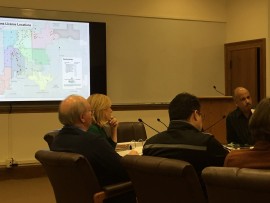Denver City Council members met again Monday to continue hashing out details of potential caps on marijuana dispensaries and grow houses. As president Chris Herndon presented an alternative to part of a proposal floated nearly two weeks ago by at-large member Robin Kniech, some remaining points of disagreement remain.
We reported at the time that Kniech’s version would include three main components: citywide location caps on dispensaries and cultivation facilities to freeze the size of the medical and recreational markets; caps covering smaller areas to prevent growth within neighborhoods that have told the council they’ve been overwhelmed by the industry; and a lottery system for new license applicants when locations open up.
At the meeting of the council’s moratorium committee, Herndon focused on the caps. He proposes a combined citywide dispensary/cultivation cap covering both stores and grow houses and limiting the industry to the 421 locations that exist now. That’s in recognition that the state’s largest marijuana market is, in his view, at saturation.
Colorado’s capital city of cannabis
Majorly unbalanced landscape: Denver’s pot businesses mostly in low-income, minority neighborhoods
NEW: Get podcasts of The Cannabist Show.
Subscribe to our newsletter here.
Watch The Cannabist Show.
Like Kniech’s proposal, his rules would encourage medical licensees to convert their businesses to the recreational side, in which cannabis products are taxed and restricted to customers 21 and older.
Unlike her plan, Herndon’s idea also would add 1,000-foot required buffer zones from schools, child care centers and alcohol/drug treatment centers for grow houses, similar to what retail marijuana stores must follow. Existing licensees would be grandfathered, allowing them to continue operating cultivation facilities in their present locations but preventing transfers of those cultivation licenses to new owner for the same restricted spots.
Some council members were unsure about that, saying an upcoming odor ordinance planned by the city might address most neighborhood concerns about living near grow houses.

Herndon said he didn’t attempt to tackle a big still-unresolved question: Should the new rules, which would replace a temporarily expanded moratorium on marijuana businesses that expires May 1, allow pending applications for new stores and grow houses to proceed?
He cited city data that 244 pending applications for marijuana licenses of different kinds, if all approved, could result in up to 62 new locations. They would be clustered heavily in neighborhoods that already have a lot of marijuana businesses, including south Denver and the Globeville/Elyria-Swansea area.
Kniech has argued the city should be fair to applicants, who applied under the belief their requests would be considered as long as they met all city rules, and set caps to allow pending applications to proceed. (Some from the industry also have opposed a closing of the market in past remarks to the council.)
“I know it’s a painful decision to make because you pick one side or another,” Herndon said. “… It’s certainly a tough decision. I lean towards stopping the pending” and supporting neighborhood advocates’ wishes.
Those topics likely will come up again when the council’s committee meets next Monday at 3 p.m. Herndon has said the council likely will firm up a proposal in coming weeks.
